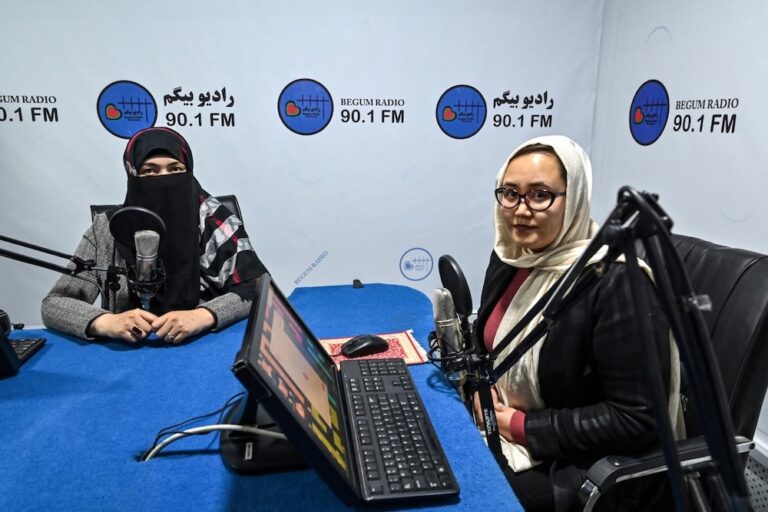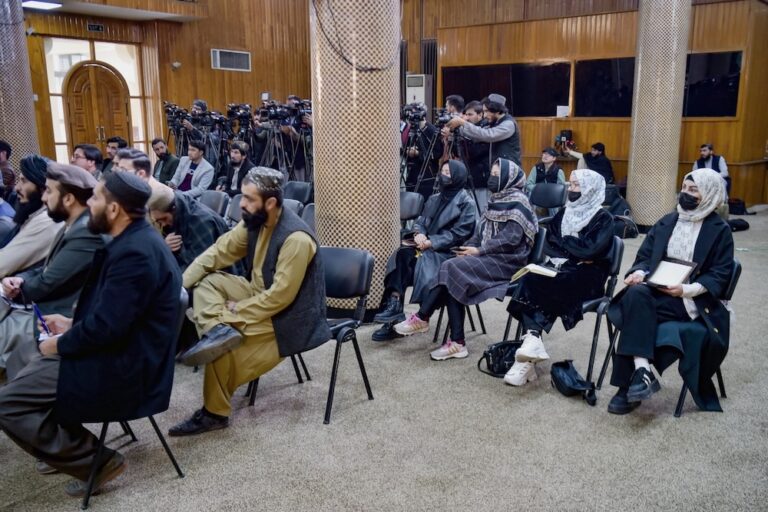(RSF/IFEX) – Hundreds of Afghan journalists and writers took part in demonstrations on 8 July 2008 in 15 provinces to call for the release of Sayed Perwiz Kambakhsh, a young journalist under sentence of death. This exemplary show of solidarity came as Kambakhsh’s appeal against his conviction has ground to a halt in Kabul and […]
(RSF/IFEX) – Hundreds of Afghan journalists and writers took part in demonstrations on 8 July 2008 in 15 provinces to call for the release of Sayed Perwiz Kambakhsh, a young journalist under sentence of death. This exemplary show of solidarity came as Kambakhsh’s appeal against his conviction has ground to a halt in Kabul and no date has been set for the next hearing.
“The appeal court should have quashed Kambakhsh’s death sentence when a forensic doctor confirmed he was tortured by the security forces,” Reporters Without Borders said. “But it was not done, and the authorities refuse to release him. A show of support from Afghans is now the key to preventing fundamentalists and certain government sectors from pressing ahead with their persecution of this journalist.”
The demonstrations in support of Kambakhsh took place in 15 provinces. Intellectuals and journalists signed petitions entitled: “we want justice and the immediate resolution of Sayed Perwiz Kambakhsh’s case.” The petitions were addressed to the provincial governors with the request that they be passed on to the Supreme Court.
Kambakhsh’s brother, fellow-journalist Yaqub Ibrahimi, said the biggest protests took place in the provinces of Bamyan, Herat, Balkh, Jalalabad and Kunduz.
Despite the government’s assurances, the appeal process has made very little progress. The Kabul appeal court is supposed to hear testimony from university students and teachers from the northern city of Mazar-i-Sharif, where Kambakhsh, himself a student of journalism, was sentenced to death on a charge of blasphemy. But they have not yet been invited to Kabul.
The judges want to interrogate them about the questions which Kambakhsh reportedly asked during a course on the role of women in Islam. “How is it a crime to ask such questions?” Reporters Without Borders wonders.
A forensic doctor’s report presented at the appeal court’s hearing on 15 June confirmed that Kambakhsh was tortured by the security forces after his arrest.
In an interview for the Italian newspaper “Corriere della Sera”, Kambakhsh said: “I am a political prisoner. The allegations against me are absurd, artificial (. . .) There are no murderers in my cell, just thieves who do not bother me. But I never go out into the corridors for fear that a pro-Taliban inmate will attack me with the aim of killing me, as already happened in Mazar-i-Sharif prison.”
A student and reporter for “Jahan-e Naw” (New World), Kambakhsh was arrested in Mazar-i-Sharif on 22 October 2007 in an apparent reprisal against his brother, an investigative journalist.
A local court sentenced him to death on 22 January at the end of a trial held behind closed doors in which he was not defended by a lawyer. His family had contacted about 10 lawyers, but they refused to represent him for fear of reprisals.


